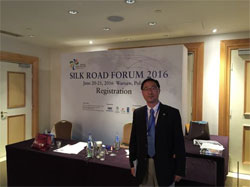Two leading scholars have been invited to deliver public lectures on Belt and Road organized by the Research Grants Council with the Hong Kong Central Library on 18 December 2016 (Sunday). Details of the lectures are as follows:
| Topic | Speaker | Time |
|---|---|---|
| The Belt and Road Initiative and Free Trade | Mr Kelvin Kwok (Assistant Professor, Faculty of Law, The University of Hong Kong) | 2:30 pm - 3:30 pm |
| The Belt and Road Initiative: Viewing Through the Prism of New Economic Geography Theory | Professor Xiangdong Wei (Dean, Faculty of Social Sciences and Professor, Department of Economics, Lingnan University) | 3:30 pm - 4:30 pm |
Venue: Lecture Theatre G/F, Hong Kong Central Library (Location
Map)
Language: Cantonese
Free admission on a first-come, first-served
basis.
For enquires, please contact us at 2524
3987 or rgc@ugc.edu.hk.
First Session
Topic: The Belt and Road Initiative and Free Trade
Speaker: Mr Kelvin Kwok
Time: 18 December 2016 (Sunday) 2:30pm - 3:30pm
| Brief introduction:
The lecture will focus on one of the co-operation priorities under the Belt and Road Initiative, namely the promotion of "unimpeded trade" between China and other Belt and Road countries. The speaker will explore the importance of the Belt and Road Initiative to China's economic development, in terms of providing new export destinations and access to low-cost supplies and labour for Chinese manufacturers. The speaker will then further explore the legal and economic issues pertaining to trade liberalisation and antitrust enforcement, how they relate to the implementation of the "unimpeded trade" objective of the Belt and Road Initiative, and the strategic considerations for China in dealing with other Belt and Road countries. About the Speaker: Mr Kelvin Kwok is an Assistant Professor of Law at The University of Hong Kong and a practising barrister at Des Voeux Chambers. He specialises in competition law in both academia and practice. Academically, he teaches competition law and publishes internationally on the subject. He has practical experience handling competition law matters involving dispute resolution, exclusion/exemption-related applications, and advisory work. He regularly gives CPD talks and accepts media interviews on competition law. He serves on the Bar Association's Special Committee on Competition Law, the Consumer Council's Competition Policy Committee, and the Hong Kong Competition Association's Executive Committee, and as a Non-Governmental Advisor to the International Competition Network. |
Second Session
Topic: The Belt and Road Initiative: Viewing Through the Prism of New Economic Geography Theory
Speaker: Professor Xiangdong Wei
Time: 18 December 2016 (Sunday) 3:30pm - 4:30pm
|
Brief introduction:
China's Belt and Road Initiative has attracted a lot of attention around the world. Many critics comment that this is more a political than an economic endeavor of China to counteract American's "Pivot to Asia" strategy or "Trans-Pacific Partnership" free trade agreement, which are viewed to contain the rising power of China both politically and economically. Others also raise the question about that true purpose of this initiative: whether it is mainly used by China to dump its labour-intensive pollution prone manufacturing industries to other developing countries and to help digest the serious over-capacity of China's industrial sector. So far, few attempts have been made to use economic theories to analyze its potential economic benefits to China and the world economy properly. The speaker will intend to use the "new Economic Geography" theory --- a theory that has been developed only 25 years ago and starts to attract more and more attention from the main-stream economists in the recent years to explain what this initiative can do to foster the development of the world economy and help reduce income gaps between rich and poor. The analysis shows that unlike the previous globalization movement that has made the world economic activities more concentrated in a few mega economic powerhouses in the developed and emerging economies, this initiative helps to decentralize economic activities and hence reduce income gaps across different regions in the world due to its paramount emphasis on building a better connected world through infrastructure investment and reducing trade and cultural barriers.
About the Speaker: Professor Xiangdong Wei is currently the Dean of the Faculty of Social Sciences in Lingnan University (LU) and Professor of the Department of Economics. He is also the Director for the Pan Sutong Shanghai-Hong Kong Economic Policy Research Centre and China Economic Research Programme in LU. His main research interests lie in economic development and labour market, in particular in the area of education and human capital investment. He and his colleagues in the above mentioned research Centre/Programme are now also engaging in research on China's belt-and-road initiative. |
Professor Xiangdong Wei attended a major forum on belt-and-road in Poland in summer 2016 |
